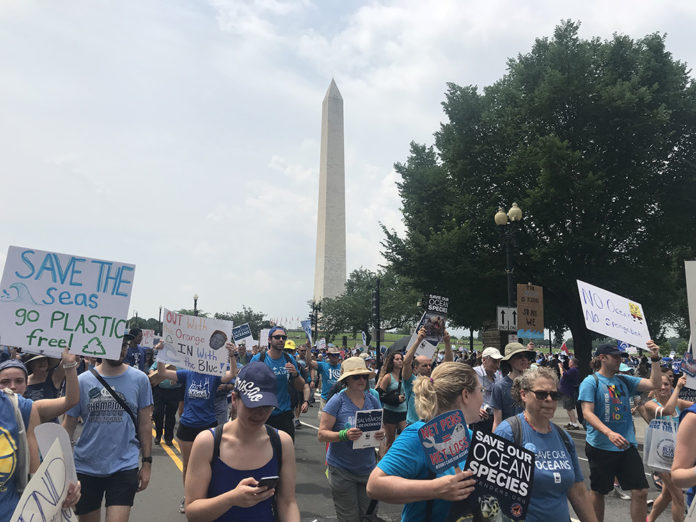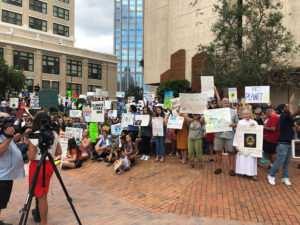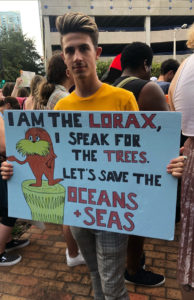
Sam Odom
Approximately 100,000 participants in Berlin, Melbourne and London, and 60,000 in the streets of Lower Manhattan, gathered for a global climate strike, on Sept. 20, 2019, ignited by 16-year-old environmentalist Greta Thunberg, as reported by the New York Times, as well as other news sources.
This protest occurred days before the United Nations Climate Action Summit of 2019 in New York, New York on Sept. 23, 2019, as well as the Youth Climate Summit that occured Sept. 21, 2019.

The purpose of the summit was to embolden countries around the world to come up “with concrete, realistic plans to enhance their nationally determined contributions by 2020, in line with reducing greenhouse gas emissions by 45 percent over the next decade and to net zero emissions by 2050,” as stated by the UN Climate Action Summit 2019’s description.
The website further states that these plans must not only reduce the environmental issues, but completely rework entire economies into sustainable economies.
The Climate Action Summit of 2019 showcased countries who increased their efforts made under the Paris Agreement, as described by the event’s opening press release.
The United States officially announced the beginning of a withdrawal from the Paris climate agreement, as reported by Rebecca Hersher in an article written on Nov. 4, 2019.
Rachel Cleetus, a member of the Union of Concerned Scientists, sees issues regarding this withdrawal.
“The reality is, to really deliver on our climate goals, we do need strong federal action,” Cleetus said. “The unfortunate reality is U.S. carbon emissions actually rose last year.”
NASA’s website breaks the climate change issue down into categories such as evidence, causes and effects. The evidence category approaches the idea of climate change denial, negating it by providing proof such as the rising temperatures worldwide, warming oceans, shrinking ice sheets, glacial retreats, decreased snow cover, rising sea levels, declining arctic sea ice, extreme events such as temperature and copious rainfall and the acidification of the oceans.
The causes explain why these daunting changes are occuring, mainly focusing on the greenhouse effect. This occurs when the earth’s atmosphere traps heat as a result of gases such as water vapor, carbon dioxide, methane, nitrous oxide and chlorofluorocarbons.
The effects section answers the question “why does this matter?” Reasons include temperatures continuing to rise, frost-free season and growing season will lengthen, changes in precipitation patterns will occur, more droughts and heat waves will occur, hurricanes will become stronger and more intense, sea level will rise 1-4 feet by 2100 and the Arctic will likely become ice free.
In the past these issues were largely ignored, so the climate strikes serve to bring this important issue to the forefront of people’s minds. Celebrities are joining in the strikes as well through social media or by attending strikes themselves and therefore using their platforms to drive the message home.
Celebrities such as Shawn Mendes, Lizzo and Ansel Elgort took to social media to show support for the climate strikes, while others such as Gisele Bündchen, Chris Hemsworth and Nev Schulman physically attended climate strikes themselves.
There are major celebrity contributors a part of movements such as “The World is in Our Hands,” an initiative by the United Nations Environment Programme. This works with the #ActNow campaign that is intended to raise awareness and inspire people to change their environmentally unsound habits.
These celebrities include Alfre Woodard, Antonio Banderas, Evan Peters, Joaquin Phoenix, Rosario Dawson, Rainn Wilson, Susan Sarandon, Michael Greyeyes and Madeline Brewer.
Jane Fonda is another prominent celebrity who told ABC News that she moved to Washington for four months in order to fully dedicate herself to fighting climate change. Fonda explains she will attend Fire Drill Fridays, a weekly event led by environmental activists held on the steps of the U.S. Capitol, and aims to be arrested every friday.
“11 o’clock every Friday morning come get arrested with me or choose not to it doesn’t matter,” Fonda said in an interview from ABC News.

Haver at a climate strike in Tampa, Fla. with Beta Beta Beta of Florida Southern College.
FSC senior Mark Haver found the climate strikes in September to be inspiring and made climate change an issue that every country should address. He stresses that the strikes long started before Sept., and still continue every Friday.
According to Haver, this movement can be seen in international developed cities, as well as a part of indiginous movements that push people to respect the land.
“The climate strikes served an opportunity for the American atmosphere to jump into the global understanding of the threat posed by the climate crisis,” Haver said.
Although the strikes were encouraging, Haver is not content with the results of the Climate Action Summit of 2019 due to America’s withdrawal from the Paris Agreement.
“Until the United States becomes a world leader on taking regulative steps to decrease greenhouse gas emissions, whether it be through rejoining the Paris Climate Agreement or negotiating something new, I will not be satisfied by any results,” Haver said.
Haver’s experience with environmental efforts is apparent by the multitude of positions he has held. His on-campus positions include former member of the sustainability committee of SGA, former Vice President of FloSoco, current Vice President and former President of Beta Beta Beta biological honors society and member of Rho Rho Rho marine biology honors society.
Haver’s honors thesis will “estimate the greenhouse gas emissions of fsc based on electricity consumption and to create a sustainable development action plan,” Haver said.
The organizations Haver has participated in are opportunities for students to contribute to climate change efforts, as well as other organizations such as nature enthusiasts, garden club, veg club and more.
His experiences extend past campus and include an Ocean Leader of Sustainable Ocean Alliance, a youth delegate to the Our Ocean Youth Leadership Summit in Malta and Norway and the Accelerators at Sea Cruise to Alaska, chair of the Florida College Democrats Environmental Caucus and Chair of College Democrats of America Environmental Caucus.
Haver weighed in on Lakeland’s climate change efforts, and feels as though the topic isn’t properly addressed.
“Lakeland and FSC need to evaluate their contribution as far as carbon dioxide equivalent emissions to climate change,” Haver said. “Until there is an assessment of how much we as a community emit and what we can do to minimize that, we’re not properly thinking about our future.”







